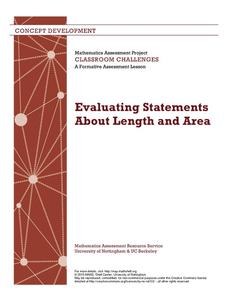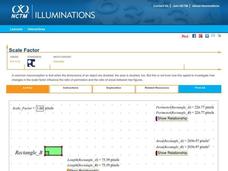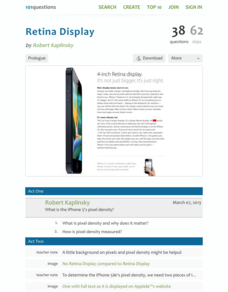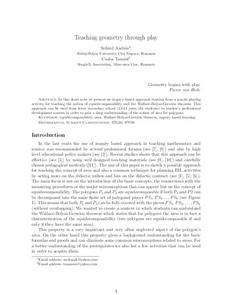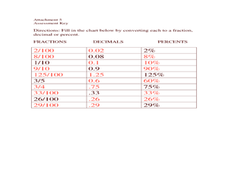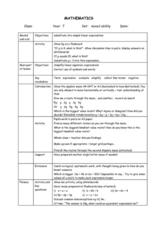Curated OER
Scale Model of the Solar System
Young scientists gain a better understanding of space, the solar system and its vastness by creating a scale model. Students first need to calculate the distance between each of the nine planets according to the size of their scale. This...
Utah Education Network (UEN)
Create, Classify, and Sort Quadrilaterals
Quadrilaterals can be quirky! Fourth graders use geoboards and bands to create four-sided figures. They analyze the attributes such as angle size and presence of parallel sides. As a result they learn to differentiate among rectangles,...
Curated OER
Long Day?
Middle schoolers become aware of the effects of tides on the Earth's rotation. In this tides lesson, students calculate the number of seconds lost over various periods of time.
Arizona Department of Education
Introduction to Integers
Welcome to the backward world of negative numbers. This introductory lesson plan teaches young mathematicians that negative numbers are simply the opposite of positive numbers as they use number lines to plot and compare single-digit...
Mathematics Assessment Project
Representing and Combining Transformations
Transform your learners into master geometers with an activity that asks them to first complete an assessment task drawing the result after transformation of a given shape in the coordinate plane. They then use cards to represent...
Mathematics Assessment Project
Evaluating Statements About Length and Area
Class members complete an assessment task by identifying whether statements about triangles and quadrilaterals are always true, sometimes true, or never true. They then participate in a sorting activity with the same objective.
Mathematics Assessment Project
Classifying Equations of Parallel and Perpendicular Lines
Parallel parking might be difficult, but finding parallel lines is fairly simple. In this lesson, learners first complete an assessment task involving parallel and perpendicular lines in the coordinate plane. Individuals then take part...
Mathematics Assessment Project
Sorting Equations and Identities
Identify the identity. Learners first solve equations to find the number of solutions. Scholars then determine if given equations are always, sometimes, or never true, leading to the concept of identities.
National Council of Teachers of Mathematics
Scale Factor
Does doubling mean everything doubles? Learners adjust the scale factor between two rectangles. Using the calculated measurements, pupils investigate the ratios between the lengths, perimeters, and areas of the rectangles.
101 Questions
Retina Display
Learners calculate the pixel density of a specific cell phone using the concept of similarity. They use information from the cell phone's website to make their calculations and then compare their results to the posted information.
Mascil Project
Teaching Geometry Through Play
Puzzle your way through to a new understanding of area. Scholars learn about the area of polygons through equidecomposability, the idea that polygons that can be decomposed into the same set of pieces have the same area. By using...
College Board
Is That an Assumption or a Condition?
Don't assume your pupils understand assumptions. A teacher resource provides valuable information on inferences, assumptions, and conditions, and how scholars tend to overlook these aspects. It focuses on regression analysis, statistical...
Curated OER
High Exposure
Students interpret data they receive from the media, discuss possible misinterpretation of data from the media and correctly respond to the misconception quiz question.
Curated OER
Acting Like a Hog
Students explore game theory. In this secondary mathematics lesson, students plat the game of HOG using dice and explore the optimal strategies. Students play the game three ways: any number of dice, a fixed number of dice and using...
Curated OER
Convert among decimals, fractions, and percents
Seventh graders convert among decimals, percents, and fraction with and without a calculator. In this seventh grade mathematics lesson, 7th graders explore strategies that help them to remember how to perform the needed operation...
Curated OER
Substitute into Simple Expressions
Learners simplify simple equations. Using a maze game, young mathematicians speculate about the size of different algebraic values and what other equivalent expressions might look like. It is a nice beginning activity for introducing...
Curated OER
Graph Of The Derivative
Students engage in a lesson that is concerned with defining and drawing the graph of a derivative. The lesson includes a definition and examples to lead them away from any misconceptions. They graph derivatives using examples that are...
Curated OER
Applied Science - Science and Math Pre - Lab (Scientific Method)
Learners examine science. In this scientific method lesson, students are introduced to what every experiment contains (hypothesis, critical thinking) and how an experiment is conducted. They watch a demonstration and then work...
Curated OER
Estimating Solutions
Finding approximate solutions to word problems allows users to assess the reasonableness of their answers. In a well-paced lesson, the class rounds numbers to estimate the solutions. They explain their thinking and determine if the...
Illustrative Mathematics
Equivalent Expressions?
Pre-algebra pupils need to understand that two expressions are only equal if they have the same value. Show them that once the expression is multiplied by a number, the value of the expression changes. It makes for a good lead-in to...
Curated OER
Rearranging Formulas
How do you solve for a variable? This slideshow provides definitions, key concepts, and guided practice to teach learners how to solve literal equations for a specified variable.
Discovery Education
Sonar & Echolocation
A well-designed, comprehensive, and attractive slide show supports direct instruction on how sonar and echolocation work. Contained within the slides are links to interactive websites and instructions for using apps on a mobile device to...
PHET
Planetary Magnetism
What do magnetic fields look like? The best way to learn about magnetic fields is to try identifying them for yourself. Scholars will understand the importance of magnetic fields after completing this experiment. The extension activities...
Curated OER
Shapes, Shapes Everywhere!
Sixth graders investigate the geometric concept of shapes. They locate shapes in their immediate environment and label them according to basic shape. The shapes that are found are recorded by the teacher on chart paper and any...







